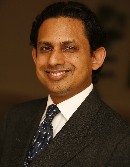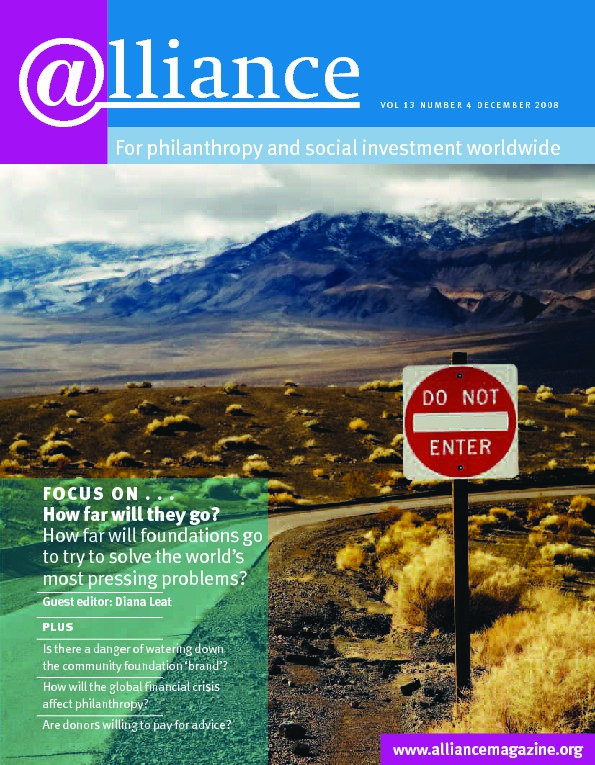 The special feature in this issue of Alliance looks at why foundations on the whole are failing to respond to emerging issues such as climate change in any way that is commensurate to the scale of the challenge. The Nand and Jeet Khemka Foundation is one that, faced by the realities of climate change, did decide on a real change of direction.
The special feature in this issue of Alliance looks at why foundations on the whole are failing to respond to emerging issues such as climate change in any way that is commensurate to the scale of the challenge. The Nand and Jeet Khemka Foundation is one that, faced by the realities of climate change, did decide on a real change of direction.
Caroline Hartnell talked to Uday Khemka about how this came about. Asked how the Foundation will respond to the present financial meltdown, Khemka warns of the danger of being deflected from the potentially far greater meltdown that will occur if we don’t tackle climate change.
How did this change in direction at the Khemka Foundation come about?
Most private family foundations are set up by a funder who is very excited by a particular issue, for example disability or some terrible disease in the family, so they set a mandate for the foundation to focus on that issue. The staff see it as their fiduciary responsibility to build an infrastructure around that mission, and when a new issue emerges, they feel it would be fiduciarily irresponsible to shift attention to it. So it’s often the family members themselves who have to make the shift.
In our case, there was a moment three years ago, listening and talking to Al Gore, when I recognized the reality of climate change in such a forceful and compelling way that I realized that everything else we were doing would be literally washed away by it. It was a sort of existential moment.
How did this affect your grantmaking?
It’s difficult to answer in those terms because we’re a mixture of grantmaking and operating foundation, but the focus has certainly changed. Prior to climate change, the focus was on urban poverty, street and slum children, social entrepreneurship. Those things are still important but the overwhelming focus has shifted to climate change – and to other issues of leadership and education which are a private passion of my elder brother. We haven’t downgraded any of our earlier programmes but we have significantly upgraded our emphasis on the environment and climate change.
How did the decision affect the Khemka Foundation?
I think climate change actually has a double dimension. It is a content area in itself but it also affects every other area. Other foundations have asked me how, when their mission is health or sanitation, do they shift to thinking about climate change. And my response is don’t: just look at your own mission and, if you’re intellectually honest, you will find that whatever it is, it’s affected by climate change. So you can start off by inducting this as an overarching dimension into your current mandate and then, as you get more used to it, you can bring it in as a second mandate as well.
Did that happen in the Khemka Foundation?
Yes, I think so. Just this morning, for example, I wrote an article on social entrepreneurship – one of our content areas – and climate change. In our educational programmes, we’re bringing in a climate change curriculum; in the area of philanthropy infrastructure, we’re looking at how we could enable climate NGOs.
Though in a way we started upside down. I think most foundations would first look at the impact of climate change on their existing programmes and then set up a new programme; in our case it’s been the other way round. We led with a discrete climate-focused push and then over time it spread to all our other programmes.
Did you have any difficulty persuading other members of your family?
There’s a lot of trust in our family, so they were very supportive. At first, people didn’t fully understand why I felt this was such a serious issue, but over time they did.
One of the big issues for our foundation was, coming from a poor country, should we really be working on a global level? Shouldn’t we be focusing our limited resources on India, where hundreds of millions of people are still in poverty? But we soon realized that climate change is such an important global issue that in so far as we could make a difference we should look at it globally, not just in India. That was probably the most interesting intellectual dimension to the discussion of our shift of mandate.
Shouldn’t leadership on global issues come from poor countries?
Yes, of course. The climate question has been framed as a northern issue being imposed on the South to constrain their development, and the argument we’ve been making is that that’s completely the wrong way round. The way to think about it is that the poorest countries are the most vulnerable, that the North has created the problem over 150 years, and that it’s time for the South both to demand action from the North and to be willing to step up to commitments of various kinds itself – but in the context of a global framework in which the North recognizes its responsibilities. But it is to do with our development. We’ve talked before about the shift from seeing climate change on the one side and development on the other to seeing climate change as fundamentally about development.[1]
Also, don’t developing countries need to take a leading role in defining the global agenda?
Yes, we need a global deal and it needs the voices of southern countries. But we don’t want to think about it only from a southern perspective. Sometimes foundations find unique assets that enable them to contribute in different ways. In our case we’ve found ourselves with global assets and relationships that can help us contribute in a global arena and not just representing our country, even though that’s very important for us.
A meltdown of the global financial system has only just been averted. How will the Khemka Foundation respond to this?
I think we need to remember that there will be a greater meltdown if we don’t do something about it. The financial crisis was caused by short-term thinking, and the same is happening in terms of the environment. There’s not enough long-term thinking and regulation. We need to have institutions, strategy, planning processes, coordination, regulation to prevent an environmental meltdown.
The danger is that the financial crisis is going to absorb so much attention that we forget about the road to Copenhagen and next year’s crucial climate change conference. Financial crises come and go – we’re going to get through this one in the next two or three years – whereas the environmental crisis is a problem that’s not going to go away. What can happen financially, economically and at the human level as a result of this environmental crisis could be many times worse than anything that comes out of this financial crisis.
Will your programmes in India be affected?
The economic effect of this global crisis has not yet been fully felt in India, it’s only affected the capital markets. If it starts affecting the poor people we work with on the development side, then obviously the foundation will have to look at it very carefully.
Is there any message you’d want to give to other foundations?
I would say four things: first, investigate honestly how serious the environmental crisis is – and my belief is that any and every foundation will find that its importance surpasses that of any other issue. Second, the impact of climate change will affect almost all foundation programmes and they should take it into account. Third, foundations should create some programme on climate change based on their understanding that this is the greatest challenge that humanity has ever faced.
Finally, though it’s important to deal with the impact of the economic crisis, we must not lose sight of the importance of the next year and a half as we go towards Copenhagen and we try to get a post-Kyoto global deal done. We must recognize that we have only seven or eight years to create a framework that stops us losing the battle of the next 30 years, of the next generation. Not only must we stay very, very focused and not be pulled off course even slightly, we should dramatically increase our commitment to solving this tremendous challenge.
1 See interview with Uday Khemka in the September 2007 issue of Alliance.
For more information
Contact Denise Lee at d.lee@khemkafoundation.org
http://www.khemkafoundation.org
http://www.climatephilanthropists.org



Comments (0)